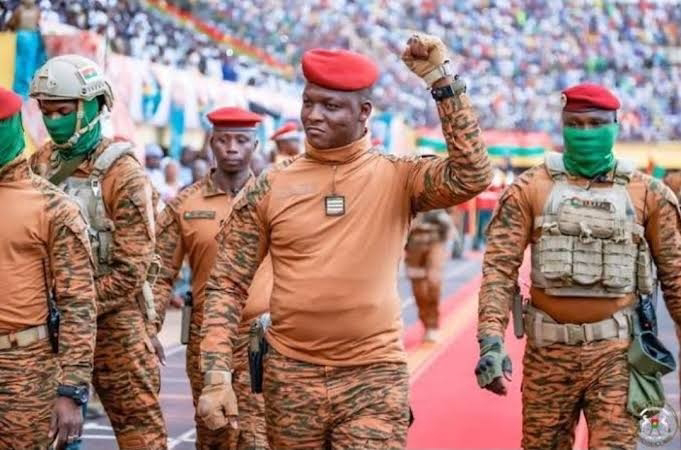By OvieOmeleh
In the heart of West Africa, a new symbol has emerged young, defiant, and unapologetically African. Captain Ibrahim Traoré, now the interim president of Burkina Faso, has become a flashpoint in the continent's ongoing psychological struggle against neocolonial dominance.
His rise is more than political; it is emblematic of a deeper war a war not only for Africa’s resources but for the minds and futures of its people.
This is the psychological warfare of the West against Africa subtle, systemic, and sustained. It is waged through the erosion of self-belief, the suppression of independent thinkers, the demonization of anti-imperialist voices, and the erasure of revolutionary dreams. It does not just assassinate leaders it assassinates the very idea of African liberation.
A Familiar Script, A New Chapter
Traoré’s emergence is no isolated phenomenon. His bold critiques of foreign interference and calls for pan-African unity echo a lineage of leaders who dared to dream outside the colonial box a lineage that has been repeatedly cut short.
Thomas Sankara, the revolutionary leader of Burkina Faso in the 1980s, sought to liberate his people from dependency. He was assassinated in a coup linked to foreign intelligence just four years into his presidency.
Patrice Lumumba, the first democratically elected Prime Minister of Congo, envisioned a sovereign and united Congo. Within months of independence, he was captured, tortured, and executed with direct Western complicity.
Kwame Nkrumah of Ghana, the intellectual force behind African unity, was overthrown in a CIA-backed coup while abroad, his vision for continental liberation shelved by puppet regimes.
Muammar Gaddafi, though controversial, posed one of the boldest challenges to Western influence through his pan-Africanist agenda, plans for an African currency, and a continental army. NATO forces destroyed Libya in 2011, leaving chaos in place of his vision.
Julius Nyerere of Tanzania, though not assassinated, endured immense pressure and isolation for advocating African socialism and self-reliance. His legacy remains largely uncelebrated by the global narrative.
These were not perfect men but they were powerful symbols of what Africa could become when it dares to think for itself.
Weaponizing Perception
The West’s most potent weapon has never been its missiles or money it is narrative. Africa’s revolutionary leaders are branded as “strongmen,” “dictators,” or “radicals” the moment they question external control. Meanwhile, regimes that serve foreign interests, no matter how corrupt or repressive, are rewarded with aid and legitimacy.
This manipulation is not accidental. It’s a calculated strategy to discourage resistance and portray autonomy as chaos. The result? A continent conditioned to distrust its own instincts and to fear its own freedom.
Ibrahim Traoré’s rejection of French influence, his unapologetic stance on sovereignty, and his emphasis on African solidarity all challenge that narrative. And that makes him dangerous not because of what he has done, but because of what he represents.
The Theft of Time
The most insidious effect of this warfare is not the assassinations alone it is the theft of time. Each coup, each foreign intervention, each dismantled movement resets the African development clock. Decades of progress are lost, ideas are buried, and generations grow up under regimes too scared or too compromised to dream big.
And still, the West asks: Why is Africa not developed?
The answer lies not only in governance or corruption but in a deliberate disruption of African time, a breaking of momentum every time the continent attempts to stand on its own terms.
A Battle for the Future
As young Africans rally around figures like Traoré, what we are witnessing is not just a political shift but a psychological one. The old fear of liberation is fading. New leaders are no longer seeking Western approval. They are seeking African answers.
But history warns us: this is the moment of greatest danger. Traoré’s boldness will be tested, targeted, and possibly sabotaged not because of his failures but because of his refusal to play by a foreign script.
To defend leaders like Traoré is not to ignore their flaws it is to defend the right of Africa to chart its own course, make its own mistakes, and create its own models of governance and progress.
Reclaiming the Narrative
The time has come for Africans and the global community to see these repeated assassinations and interventions for what they are: not isolated events but part of a long war on African self-determination.
This war is fought in boardrooms, in headlines, in the history books. It will be won not only with political power but with psychological emancipation.
Ibrahim Traoré is a symbol. What we do with that symbol whether we protect it, challenge it, or let it be crushed like those before him will say everything about whether Africa is truly ready to reclaim its narrative.


.jpg)









0 Comments